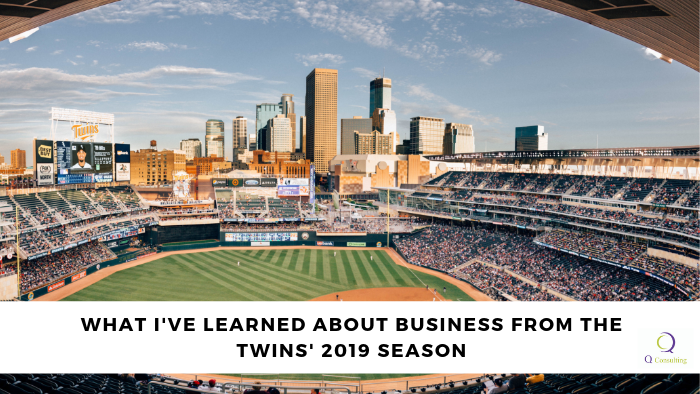The Twins are knocking it out of the park this year, literally! In addition to their outstanding season so far, they’re on pace to break the Major League Baseball record for most home runs in a season. Compared to their last 5 seasons, the Twins look like a completely different team. This got me thinking…how is it that the Twins can have a lousy season followed by a record breaking one? What have they done differently to impact this change? Finally, if a sports team can drastically improve season to season, are there lessons we can mimic to positively affect our business?
Let’s start with the differences from past seasons to the 2019 season…
- First, player autonomy. The Twins hired Rocco Baldelli, the youngest manager in Major League Baseball, and he is actively shaking up the status quo. Although the former manager Paul Molitor was a hall of famer and great manager overall, the Twins were in desperate need of a fresh perspective. Rocco’s philosophy is one that encourages players to choose whatever is best for them individually. With this, there are no mandatory routines or batting practices, he feels players should workout and practice when they need to, sleep when they need to and eat when they need to. He ultimately gives players a lot of freedom to make the decisions that are best for them as individuals and clearly… it’s working!
- Secondly, collaboration. The team is gelling better than past seasons. The team is a mix of rookies, veterans and everyone in between! Nelson Cruz, a Dominican-American baseball vet, has been a trailblazer in creating this environment. Cruz relates to and mentors green players and encourages everyone on the team to embrace individuality. The freedom and emphasis on embracing individuality has created a culture of respect which in return has brought the team closer together. Everyone is embracing who they are, the experience they have, and what they can learn from each other.
- Next, making data-driven decisions. The Twins are taking an analytics-based approach to make smarter decisions. According to Pat Borzi in his Minnpost article, “Chief Baseball Officer Derek Falvey modernized the club’s pitching instruction since his arrival in October 2016, emphasizing biomechanics, technical analysis and analytics-based scouting.” The manager, pitching coach, hitting coach and entire leadership staff are making data-driven decisions and leading the team to predicted success.
- Finally, clubhouse culture. There is buzz! The teammates motivate, support, drive and celebrate each other. The team is having a blast and it’s clear because they’re laughing, they’re having fun, and they’re winning!
As a business owner, I’ve noticed similarities between the Twins having a comeback season and making a comeback in business after a tough season. The Twins provide a great example, full of lessons and questions we can challenge our teams with off the baseball diamond, such as:
- Team autonomy: Does your team feel empowered to do what is right for them to be most effective and efficient? As a leader are you flexible in your approach, avoiding a one size fits all management style, to help each individual succeed? It’s proven here that team members who are treated and trusted as professionals are far more successful.
- Fresh perspective: Does your organization or team need a fresh perspective? Are you doing things “the way you’ve always done them” and expecting a different outcome? Business is constantly changing, evolving and adapting. Is your organization or team rolling with the changes or resisting them? A fresh perspective doesn’t always need to be a new hire. It can be getting back to the basics and doing things without cutting corners. It can be as simple as asking for new opinions or brainstorming with other leaders in the same industry.
- Collaboration and culture: How well is your team gelling? Do your team members have the freedom to express and embrace their individuality? There’s no doubt the importance of team cohesiveness. Is your team driving each other, holding each other accountable and celebrating each other’s wins? If not, I encourage you to influence your team to do so!
- Data-driven decisions: How does your organizations make business decisions? Do you make decisions based off feelings more often than data? Are you collecting valuable data that will help you predict future business trends and success? If not, this may be a good place to start!
I am stoked to watch our hometown team grow and mature, and not only that, but watch the group have a great time while doing so! It’s clear there is a correlation between baseball and business. I challenge you to shake things up with your own teams for a new outcome. We all need to weather the storm sometimes, but nothing is better than sun after the storm… With a fresh perspective, who knows what the next season could bring!
